In grammar, a noun is a word that represents a concrete or abstract thing, such as living creatures, places, actions, qualities, states of existence, and ideas. A noun may serve as an object or subject within a phrase, clause, or sentence.
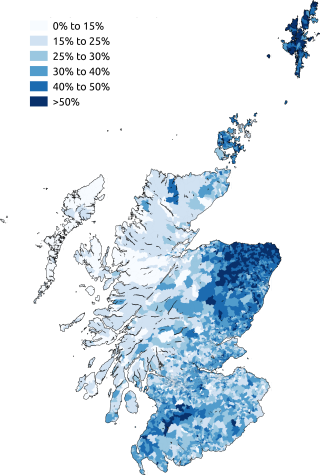
Scots is an Anglic language variety in the West Germanic language family, spoken in Scotland and parts of Ulster in the north of Ireland. Most commonly spoken in the Scottish Lowlands, Northern Isles, and northern Ulster, it is sometimes called Lowland Scots to distinguish it from Scottish Gaelic, the Goidelic Celtic language that was historically restricted to most of the Scottish Highlands, the Hebrides, and Galloway after the sixteenth century; or Broad Scots to distinguish it from Scottish Standard English. Modern Scots is a sister language of Modern English, as the two diverged independently from the same source: Early Middle English (1100–1300).
Scotch is an adjective in English, meaning "of or from Scotland". Many Scots dislike the term Scotch and some consider it offensive. The modern usage in Scotland is Scottish or Scots, and the word Scotch is now only applied to specific products, mostly food or drink, such as Scotch whisky, Scotch pie and Scotch broth.
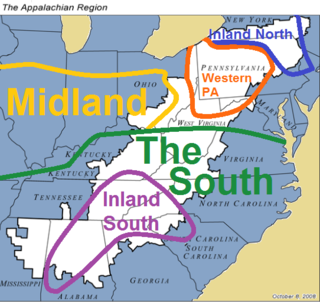
Western Pennsylvania English, known more narrowly as Pittsburgh English or popularly as Pittsburghese, is a dialect of American English native primarily to the western half of Pennsylvania, centered on the city of Pittsburgh, but potentially appearing in some speakers as far north as Erie County, as far west as Youngstown, Ohio, and as far south as Clarksburg, West Virginia. Commonly associated with the working class of Pittsburgh, users of the dialect are colloquially known as "Yinzers".

OK is an English word denoting approval, acceptance, agreement, assent, acknowledgment, or a sign of indifference. OK is frequently used as a loanword in other languages. It has been described as the most frequently spoken or written word on the planet.
Scottish English is the set of varieties of the English language spoken in Scotland. The transregional, standardised variety is called Scottish Standard English or Standard Scottish English (SSE). Scottish Standard English may be defined as "the characteristic speech of the professional class [in Scotland] and the accepted norm in schools". IETF language tag for "Scottish Standard English" is en-scotland.

"Auld Lang Syne" is a popular Scottish song, particularly in the English-speaking world. Traditionally, it is sung to bid farewell to the old year at the stroke of midnight on New Year's Eve/Hogmanay. By extension, it is also often heard at funerals, graduations, and as a farewell or ending to other occasions; for instance, many branches of the Scouting movement use it to close jamborees and other functions.

The Broons is a comic strip in Scots published in the weekly Scottish newspaper The Sunday Post. It features a Brown family, which lives in a tenement flat at 10 Glebe Street in the fictional Scottish town of Auchentogle or Auchenshoogle.
In English, the word like has a very flexible range of uses, ranging from conventional to non-standard. It can be used as a noun, verb, adverb, adjective, preposition, particle, conjunction, hedge, filler, quotative, and semi-suffix.
Sasine in Scots law is the delivery of feudal property, typically land.

Duddingston Kirk is a Parish Church in the Church of Scotland, located adjacent to Holyrood Park in Duddingston Village, on the east side of the City of Edinburgh. Regular services are held at the kirk, conducted by the minister, Rev Dr James A. P. Jack.

Sawney was an English nickname for a Scotsman, now obsolete, and playing much the same linguistic role that "Jock" does now. The name is a Lowland Scots diminutive of the favourite Scottish first name Alexander from the last two syllables. The English commonly abbreviate the first two syllables into "Alec".

A bawbee was a Scottish sixpence. The word means a debased copper coin, valued at six pence Scots, issued from the reign of James V of Scotland to the reign of William II of Scotland. They were hammered until 1677, when they were produced upon screw presses.
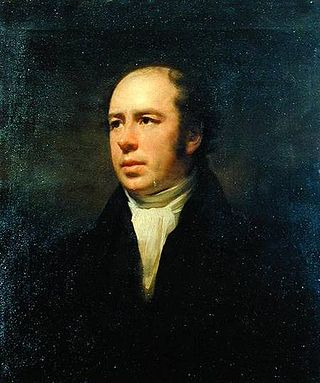
Rev John Thomson FRSE HonRSA was a Scottish minister of the Church of Scotland and noted amateur landscape painter. He was the minister of Duddingston Kirk from 1805 to 1840.
The 'apologetic' or parochial apostrophe is the distinctive use of apostrophes in some Modern Scots spelling. Apologetic apostrophes generally occurred where a consonant exists in the Standard English cognate, as in a' (all), gi'e (give) and wi' (with).
A Scotticism is a phrase or word, used in English, which is characteristic of Scots.
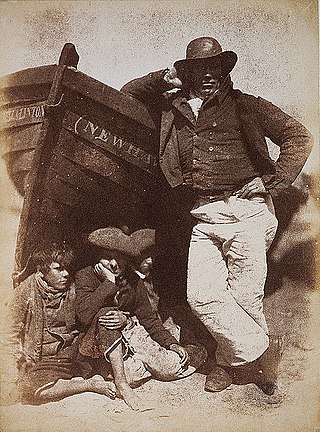
Bairn is a Northern England English, Scottish English and Scots term for a child. It originated in Old English as "bearn", becoming restricted to Scotland and the North of England c. 1700. In Hull the r is dropped and the word Bain is used.

Northumbrian dialect refers to any one of several traditional English dialects spoken in the historic counties of Northumberland and County Durham. The term 'Northumbrian' can refer to the region of Northumbria but can also refer specifically to the county of Northumberland. This article focuses on the former definition and thus includes varieties from throughout the wider region, including Durham as well as Northumberland.
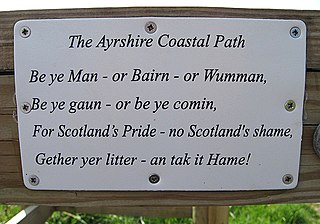
Modern Scots comprises the varieties of Scots traditionally spoken in Lowland Scotland and parts of Ulster, from 1700.












